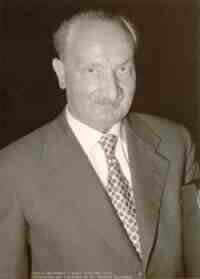 Martin Heidegger (September 26, 1889 – May 26, 1976) was an influential German philosopher. His best known book, Being and Time, is generally considered to be one of the key philosophical works of the 20th century.
Martin Heidegger (September 26, 1889 – May 26, 1976) was an influential German philosopher. His best known book, Being and Time, is generally considered to be one of the key philosophical works of the 20th century.Introduction
Heidegger claimed that Western philosophy has, since Plato, misunderstood what it means for something to be, tending to approach this question in terms of a being, rather than asking about being itself. In other words, Heidegger believed all investigations of being have historically focused on particular entities and their properties, or have treated being itself as an entity, or substance, with properties. A more authentic analytic of being would, for Heidegger, investigate "that on the basis of which beings are already understood," or that which underlies all particular entities and allows them to show up as entities in the first place.But since philosophers and scientists have overlooked the more basic, pre-theoretical ways of being from which their theories derive, and since they have incorrectly applied those theories universally, they have confused our understanding of being and human existence. To avoid these deep-rooted misconceptions, Heidegger believed philosophical inquiry must be conducted in a new way, through a process of retracing the steps of the history of philosophy.
Heidegger argued that this misunderstanding, commencing from Plato, has left its traces in every stage of Western thought. All that we understand, from the way we speak to our notions of "common sense," is susceptible to error, to fundamental mistakes about the nature of being. These mistakes filter into the terms through which being is articulated in the history of philosophy—reality, logic, God, consciousness, presence, et cetera. In his later philosophy, Heidegger argues that this profoundly affects the way in which human beings relate to modern technology.
His work has exercised a deep influence on philosophy, theology and the humanities, being key to the development of existentialism, hermeneutics, deconstructionism, postmodernism, and continental philosophy in general. Heidegger's thought directly informs the works of major philosophers such as Karl Jaspers, Leo Strauss, Hans-Georg Gadamer, Jean-Paul Sartre, Emmanuel Lévinas, Hannah Arendt, Maurice Merleau-Ponty, Michel Foucault, and Jacques Derrida.
More...


No comments:
Post a Comment